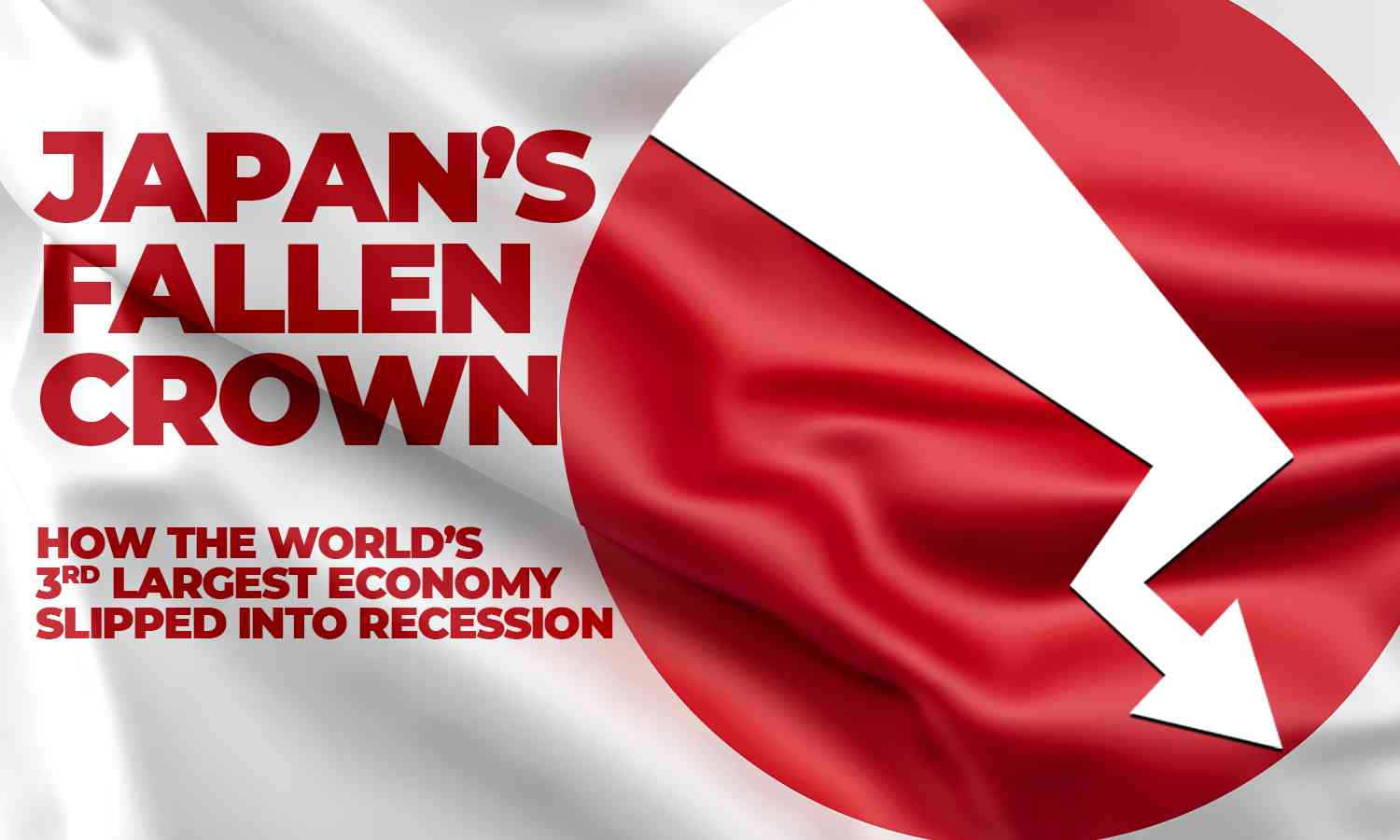Understanding Recession - A quick summary for the uninitiated in the jargons
A recession is a significant economic downturn characterised by a sustained period of contraction in a nation's economy. It is commonly defined as a period of two consecutive quarters, or six months, during which the country's gross domestic product (GDP) declines. However, other factors beyond just GDP may also contribute to the definition of a recession.
During a recession, economic activity typically slows down, leading to decreased consumer spending, reduced business investment, and declining industrial output. Unemployment tends to rise as businesses cut back on hiring or lay off workers, exacerbating financial hardships for individuals and families. Consequently, consumer confidence may plummet, further dampening economic activity.

Recessions can vary in duration and severity. While some recessions may last only a few months, others can persist for several years. Moreover, even after the official end of a recession, it may take time for the economy to fully recover to its pre-recession levels of growth and employment.
Various factors can contribute to the onset of a recession, including weak domestic demand, elevated inflation rates, decreased industrial production, and spikes in commodity prices such as crude oil. External factors, such as global economic conditions or geopolitical tensions, can also play a role in triggering or exacerbating a recession.
Navigating through a recessionary period can be challenging for policymakers, businesses, and individuals alike. Government interventions, monetary policy adjustments, and fiscal stimulus measures are often implemented to mitigate the impact of a recession and facilitate economic recovery.
Japan’s Fallen Crown - How the world’s 3rd Largest Economy Slipped into Recession

Japan, once holding the esteemed position as the world's third-largest economy, now finds itself slipping into a recessionary phase, trailing behind Germany and dropping to the fourth spot globally. This shift became evident as Japan's economic performance faltered in the final quarter of 2023. According to data released by the Cabinet Office, Japan's economy contracted by 0.4% on an annual basis during the October to December period. While the economy managed to expand by 1.9% over the entirety of 2023, the downturn in the preceding quarters, notably a significant 2.9% contraction from July to September, singled a troubling trend. The consecutive decline over two quarters fulfils the criteria for a technical recession, indicating underlying challenges within the economic landscape.
Japan, a former contender for the second-largest economy until China's surge in 2010, recorded a nominal GDP of $4.2 trillion in the past year. This figure, however, places it slightly behind Germany, whose nominal GDP stood at $4.4 trillion, or potentially $4.5 trillion depending on currency conversion rates. The implications of Japan's economic downturn not only alter its global standing but also underscore the need for strategic measures to address the root causes of the recession and steer the economy back on a path of sustainable growth and competitiveness.

The shift to fourth place in the global economy was notably influenced by the depreciation of the Japanese yen, a pivotal factor when comparing nominal GDP figures in dollar terms. However, economists assert that Japan's diminished position also stems from broader challenges, including a declining population and lagging productivity and competitiveness.
Real Gross Domestic Product (GDP) serves as a fundamental gauge of a nation's economic output, encompassing the total value of its goods and services. The annual rate, crucial for assessing economic performance, extrapolates the quarterly rate to project the hypothetical outcome if sustained over a full year. Japan earned renown as an "economic miracle," a testament to its remarkable resurgence from the devastation of World War II to claim the position of the world's second-largest economy, trailing only the United States. This ascent endured through the 1970s and 1980s, marking Japan as a powerhouse of economic prowess.

However, over the past three decades, Japan's economic trajectory has been marked by a more subdued narrative. Despite occasional periods of moderate growth, the economy has largely languished, particularly in the aftermath of the collapse of its financial bubble in 1990. This prolonged period of stagnation has characterised much of Japan's recent economic history. Interestingly, parallels can be drawn between the Japanese and German economies. Both nations boast robust foundations powered by a multitude of small and medium-sized enterprises renowned for their strong productivity levels. This shared characteristic underscores the resilience and vitality inherent in their economic structures.
During the 1960s to the 1980s, Germany experienced a period akin to Japan's economic surge, characterised by remarkable growth and dominance in global markets. Renowned for its high-quality luxury cars and cutting-edge industrial machinery, Germany solidified its position as a global economic powerhouse. The nation's export prowess was so formidable that approximately half of its economic activity revolved around international trade. However, recent economic indicators paint a different picture for Germany. Despite its historical success, Germany encountered significant challenges, with its economy languishing as one of the worst-performing globally in the previous year. This downturn was underscored by a contraction of 0.3% in the final quarter, highlighting the complexities and uncertainties plaguing its economic landscape.
Similarly, Britain faced its own economic setbacks towards the end of last year. Reports revealed that Britain's economy entered a technical recession during the October to December period, experiencing a 0.3% shrinkage compared to the previous quarter. This decline followed a 0.1% contraction in the preceding three-month period, signalling a troubling trend of economic contraction.

These developments underscore the interconnectedness of global economies and the challenges posed by fluctuating economic conditions, prompting policymakers and stakeholders to navigate with caution amidst uncertain times. Japan, characterised by its insular geography and relatively low influx of foreign residents, has grappled with the twin challenges of a shrinking and aging population for several years. In stark contrast, Germany's population has surged to nearly 85 million, buoyed by significant immigration that has helped offset its low birth rate. The latest demographic data vividly capture the contrasting trajectories of these two nations.
Tetsuji Okazaki, a distinguished professor of economics at the University of Tokyo, aptly observes that these realities paint a sobering picture of Japan's diminishing influence on the global stage. The demographic shifts portend a future where Japan's once-commanding presence in the international arena may be eclipsed, underscoring the profound implications of its demographic and economic dynamics. The disparity between developed nations and emerging economies is steadily narrowing, with India poised to surpass Japan in nominal GDP within the coming years. While the United States maintains its firm position as the world's largest economy, boasting a GDP of $27.94 trillion in 2023, China follows closely behind at $17.5 trillion. India, although currently at approximately $3.7 trillion, exhibits a robust growth trajectory, with its economy expanding at an impressive rate of around 7% annually.

Addressing Japan's labor shortage presents a complex challenge, with immigration emerging as a potential solution. However, Japan's historical stance on foreign labor has been relatively reserved, primarily limited to temporary stays. This approach has drawn criticism for fostering perceptions of discrimination and contributing to a lack of diversity within the country. As Japan grapples with these issues, the debate surrounding immigration policies continues to unfold, highlighting the intricate balance between economic necessity and cultural considerations. In addition to immigration, robotics represents another potential avenue for addressing Japan's labor shortage, although its deployment has yet to reach a level where it can entirely compensate for the scarcity of workers. Moreover, stagnating wages have contributed significantly to Japan's sluggish economic growth, leading households to exhibit reluctance towards spending.
Simultaneously, businesses have directed substantial investments towards faster-growing economies abroad, rather than prioritising the aging and shrinking domestic market. This trend underscores the complex dynamics influencing Japan's economic landscape.

“Economists analysing the situation emphasise that GDP growth is likely to decelerate further, with forecasts indicating a slowdown from 1.9% in 2023 to approximately 0.5% in the current year. This projection underscores the challenges Japan faces in its economy amidst structural shifts and demographic transformations.”
First recession in the Post-Brexit UK:

In the United Kingdom, the economy experienced a decline in the fourth quarter, with GDP contracting by 0.3%. This downturn surpassed the 0.1% drop that economists had forecasted, as reported by data from the Office for National Statistics. The fourth-quarter contraction followed a previously unrevised decline of 0.1% in the preceding three months, indicating a continuation of economic challenges. Liz McKeown, the director of economic statistics at the ONS, noted that the output of every major sector in the economy experienced a decline during this period. Specifically, manufacturing, construction, and wholesale sectors were identified as the primary contributors to the downturn, although there were some mitigating factors such as increases in the hospitality industry and the rental of vehicles and machinery. This data underscores the complexity of the economic landscape in the UK, highlighting the challenges faced by various sectors and the need for targeted strategies to stimulate growth and resilience in the face of ongoing uncertainties.

Rishi Sunak's commitment to fostering economic growth was a cornerstone of his agenda, with pledges aimed at upping UK's economy. However, recent data from the Office for National Statistics (ONS) paint a sobering picture of the country's economic performance during his tenure.
In Sunak's first full year as prime minister, the UK experienced stagnation, with fourth-quarter GDP declining by 0.2% compared to the previous year. Moreover, overall growth for the year 2023 was a mere 0.1%, highlighting the challenges of achieving meaningful economic expansion under current conditions.

These figures underscore the significant pressures facing households across the UK. The decision by the Bank of England to maintain interest rates at a 14-year high has resulted in elevated borrowing costs, including mortgages, further straining household finances. Additionally, the substantial decline in Britain's economic output during the final quarter of 2023 marks the most significant drop since the onset of the pandemic in early 2021. This downturn reflects ongoing challenges stemming from the pandemic's lingering effects, as well as broader economic headwinds impacting the UK's recovery efforts. As policymakers and stakeholders grapple with these challenges, there is a pressing need for targeted interventions to stimulate economic growth, alleviate household financial burdens, and foster resilience in the face of continued uncertainty.
Where does India stand in all this? A Perspective

These recent developments in the global economy have highlighted contrasting trajectories among major nations, with significant implications for the broader market landscape. Japan's unexpected descent into recession, marked by consecutive quarters of contraction, underscores the challenges stemming from sluggish domestic demand. This downturn not only impacts Japan's economic standing but also relinquishes its position as the world's largest economy to Germany, signalling a shifting dynamic in global economic powerhouses. Similarly, the United Kingdom's plunge into recession casts doubt on Sunak's economic stewardship, particularly in the lead-up to a pivotal general election.
In contrast, India emerges as a beacon of resilience and growth on the global stage. Despite geopolitical tensions and economic headwinds, India maintains its status as the fastest-growing major economy worldwide. The International Monetary Fund's optimistic projections, forecasting robust economic growth of 6.5% for both 2024 and 2025, further solidify India's position as a 'bright spot' in the global economic landscape. These divergent trajectories among key economies underscore the complex interplay of domestic policies, external factors, and structural dynamics shaping the global market. As investors and stakeholders navigate this evolving landscape, attention will be focused on how these trends influence investment strategies, trade patterns, and overall market sentiment in the months ahead.

Author’s note:
Japan and the UK are in recessions. Is the US next? Or is it South Korea, with it’s abysmal birth rates, going to be the next big market to collapse? Is late stage capitalism starting to show signs of falling apart at the seams, and is China going to maintain it’s behemoth status in the coming decade? VYGR will keep your informed. So follow us on our socials, download our app to stay on top of things, with India’s youngest and fastest growing media platform.


























